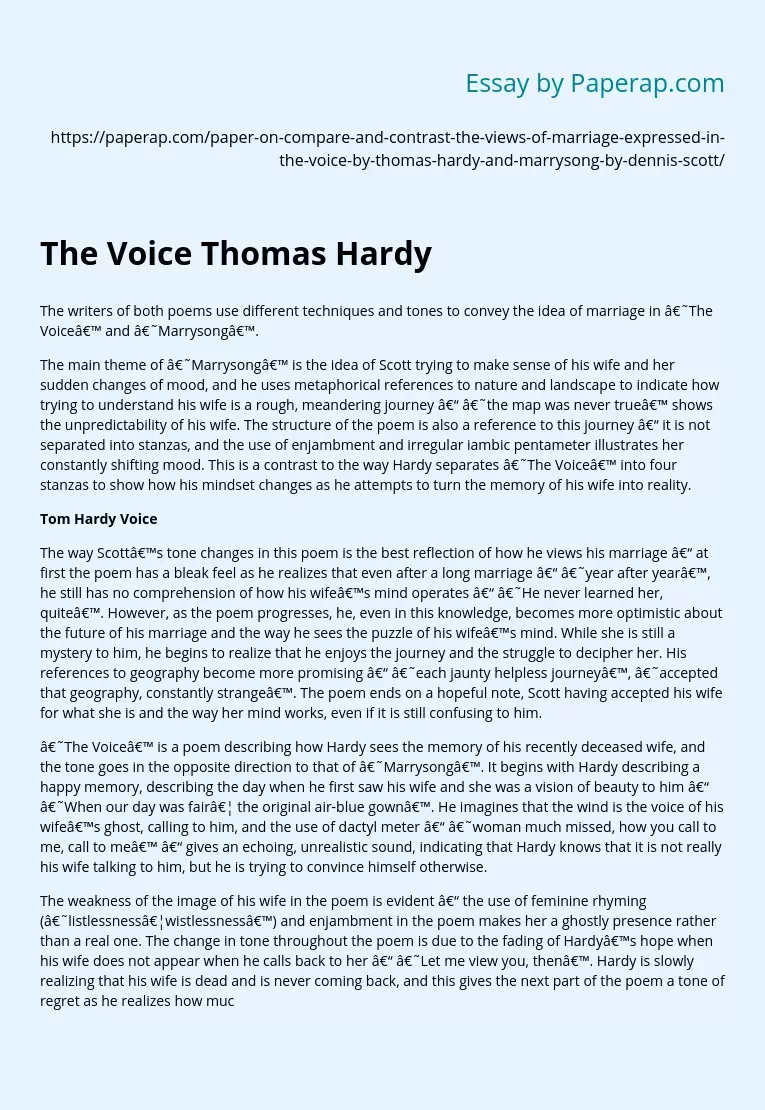The Voice Thomas Hardy
The writers of both poems use different techniques and tones to convey the idea of marriage in ‘The Voice’ and ‘Marrysong’.
The main theme of ‘Marrysong’ is the idea of Scott trying to make sense of his wife and her sudden changes of mood, and he uses metaphorical references to nature and landscape to indicate how trying to understand his wife is a rough, meandering journey – ‘the map was never true’ shows the unpredictability of his wife. The structure of the poem is also a reference to this journey – it is not separated into stanzas, and the use of enjambment and irregular iambic pentameter illustrates her constantly shifting mood.
This is a contrast to the way Hardy separates ‘The Voice’ into four stanzas to show how his mindset changes as he attempts to turn the memory of his wife into reality.
Tom Hardy Voice
The way Scott’s tone changes in this poem is the best reflection of how he views his marriage – at first the poem has a bleak feel as he realizes that even after a long marriage – ‘year after year’, he still has no comprehension of how his wife’s mind operates – ‘He never learned her, quite’.
However, as the poem progresses, he, even in this knowledge, becomes more optimistic about the future of his marriage and the way he sees the puzzle of his wife’s mind. While she is still a mystery to him, he begins to realize that he enjoys the journey and the struggle to decipher her.
His references to geography become more promising – ‘each jaunty helpless journey’, ‘accepted that geography, constantly strange’. The poem ends on a hopeful note, Scott having accepted his wife for what she is and the way her mind works, even if it is still confusing to him.
‘The Voice’ is a poem describing how Hardy sees the memory of his recently deceased wife, and the tone goes in the opposite direction to that of ‘Marrysong’. It begins with Hardy describing a happy memory, describing the day when he first saw his wife and she was a vision of beauty to him – ‘When our day was fair… the original air-blue gown’. He imagines that the wind is the voice of his wife’s ghost, calling to him, and the use of dactyl meter – ‘woman much missed, how you call to me, call to me’ – gives an echoing, unrealistic sound, indicating that Hardy knows that it is not really his wife talking to him, but he is trying to convince himself otherwise.
The weakness of the image of his wife in the poem is evident – the use of feminine rhyming (‘listlessness…wistlessness’) and enjambment in the poem makes her a ghostly presence rather than a real one. The change in tone throughout the poem is due to the fading of Hardy’s hope when his wife does not appear when he calls back to her – ‘Let me view you, then’. Hardy is slowly realizing that his wife is dead and is never coming back, and this gives the next part of the poem a tone of regret as he realizes how much he misses his wife and how little he appreciated her when she was alive. The use of alliteration in the last stanza – ‘faltering forward’ and ‘thin through the thorn’ hardens this difficult reality.
The main difference between the way marriage is perceived by Hardy and by Scott is the way they look at the future of their marriage. Scott’s wife is still alive, and although he may not understand her, he has learnt through his journey of attempting to that he enjoys trying to decipher her – ‘Stayed home increasingly to find his way among the landscapes of her mind’. Hardy’s marriage began well, but soured when he and his wife grew apart, and now that she is dead he has begun to realize how much he misses her and needs her. The poem is full of regret as he realizes that he never appreciated her and now his chance to do so has gone.
Both poets discuss and criticize the inconsistency of marriage. Scott does not understand the constant shift in his wife’s mood, whereas Hardy’s marriage was inconsistent in a way that involved the way he and his wife felt about each other. The poems share the theme of change, but the change moves in opposite directions – at the beginning of ‘The Voice’, Hardy reacts to his inability to accept his wife’s death by convincing himself that she is talking to him, and as the poem progresses the realization that he will never see his wife again, and never will have the chance to appreciate her sets in, ending the poem on a melancholy note. In contrast, ‘Marrysong’ begins on a hopeless note as Scott realizes that even after years of trying he is unable to understand his wife. However, throughout the poem he also has a revelation, but in this case a positive one, that he enjoys the mystery of his wife and
The Voice Thomas Hardy. (2019, Dec 05). Retrieved from https://paperap.com/paper-on-compare-and-contrast-the-views-of-marriage-expressed-in-the-voice-by-thomas-hardy-and-marrysong-by-dennis-scott/

